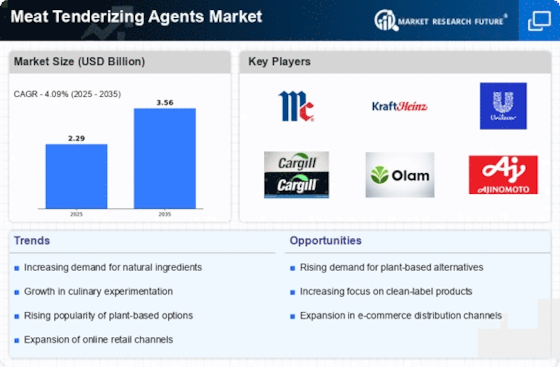Top Industry Leaders in the Meat Tenderizing Agents Market

Strategies Adopted by Meat Tenderizing Agents Key Players
The Meat Tenderizing Agents market is a vital segment within the food industry, and its competitive landscape is shaped by key players, their strategic approaches, market share factors, emerging entities, industry news, ongoing investment trends, and the overall competitive scenario. This analysis provides insights into the major players, their strategies, key market share determinants, recent developments, and the overall dynamics of the Meat Tenderizing Agents market as of 2023.
Key Players:
McCormick & Company Inc. (US)
Tampico Spice Co. Inc. (US)
Enzyme Bioscience Pvt Ltd. (India)
Enzybel Group (Belgium)
Amano Enzyme Inc. (China)
The Basque Company (US)
Specialty Enzymes & Probiotics (China)
Enzyme Development Corporation (US)
AB Enzymes GmbH (Germany)
Enzyme Solutions (US)
Giellepi
Strategies adopted by key players in the Meat Tenderizing Agents market revolve around technological innovation, sustainable sourcing, market diversification, and strategic partnerships. Technological innovation is crucial as companies invest in advanced enzymatic and chemical solutions to enhance meat tenderization processes. This strategy ensures efficiency and consistency in delivering high-quality tenderized meat products.
Sustainable sourcing has become a focal point for companies in response to growing consumer demand for ethically and environmentally sourced ingredients. Key players emphasize responsible sourcing practices, including the selection of enzymes and agents that align with sustainable and ethical standards.
Market diversification is another key strategy, with companies expanding their product portfolios to cater to various segments within the meat industry. This includes offerings for different types of meat, processing methods, and end-use applications, allowing companies to tap into a broader market base.
Strategic partnerships are essential for companies aiming to strengthen their position in the Meat Tenderizing Agents market. Collaborations with meat processors, distributors, and retailers facilitate a more comprehensive market reach. Partnerships also enable companies to stay attuned to market demands and emerging trends.
Market Share Analysis:
The determination of market share in the Meat Tenderizing Agents market is influenced by factors such as product effectiveness, supply chain efficiency, regulatory compliance, and brand reputation. Companies that produce highly effective tenderizing agents with proven results gain a competitive edge, leading to increased market share.
Efficiency in the supply chain is crucial for ensuring a steady and reliable source of tenderizing agents. Key players often establish robust supply chain networks, working closely with manufacturers, distributors, and retailers to streamline the procurement and distribution processes.
Adherence to regulatory standards is a prerequisite for market share growth. Companies that invest in research and development to ensure compliance with international and local regulations maintain credibility and consumer trust. Stringent quality control measures contribute to market share by providing consistently reliable products.
Brand reputation is a significant factor influencing market share, especially in a market where trust and reliability are paramount. Companies with a strong and positive brand image, built on transparency, quality, and ethical practices, are more likely to capture a larger share of the market.
News & Emerging Companies:
The Meat Tenderizing Agents market often revolves around advancements in enzymatic technologies, applications in new meat products, and collaborations between key players and research institutions. Emerging companies in the field typically focus on niche areas, such as specialized meat types or unique tenderizing techniques.
Industry news also highlights the development of innovative solutions to address specific challenges in meat tenderization. Collaborations between companies and research institutions contribute to ongoing advancements, shaping the landscape of Meat Tenderizing Agents with novel technologies and applications.
Industry Trends:
The Meat Tenderizing Agents market underscore a commitment to research and development, sustainable practices, and technology adoption. Companies invest in enhancing enzymatic solutions, exploring new ingredients, and improving the efficiency of existing tenderizing agents.
Research and development efforts focus on creating tenderizing agents that cater to specific consumer preferences, including clean-label options and natural alternatives. Investments in technology aim to optimize the tenderization process, making it more efficient and cost-effective.
Sustainable practices remain a key investment trend, aligning with broader industry movements towards environmental responsibility. Companies invest in sourcing practices that reduce environmental impact and explore eco-friendly packaging solutions to address consumer concerns about sustainability.
Competitive Scenario:
The Meat Tenderizing Agents market is characterized by a competitive and dynamic landscape, where companies balance technological innovation, sustainability, and market responsiveness. Established players leverage their technological expertise and global presence, while emerging companies contribute to the market's vibrancy through niche solutions and innovative approaches.
The versatility of Meat Tenderizing Agents allows companies to adapt to evolving consumer preferences, creating a competitive environment where those who can efficiently respond to market demands and deliver high-quality solutions are positioned for success.
Recent Development
The Meat Tenderizing Agents market was the increased focus on clean-label solutions. Key players responded to consumer demand for transparency by introducing tenderizing agents with simpler ingredient lists, devoid of artificial additives. This development aligns with the broader industry trend towards clean-label products, reflecting the growing importance of consumer preferences in shaping market strategies.











